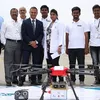Pivots and persistence: how TiE Hyderabad helped local entrepreneurs weather four months of the pandemic
Startups and corporates alike have been struggling for the past four months since the coronavirus-led national lockdown was imposed. Amid the upheaval, here’s how TiE Hyderabad has helped local startups thrive.
The COVID-19 pandemic has turned livelihoods and careers upside down around the world. But life is going on, and a range of entrepreneurship support organisations have stepped up to tackle the impact of the pandemic.

This includes TiE Hyderabad, the local chapter of the global network called The Indus Entrepreneurs, founded in Silicon Valley in 1992. See also our earlier profiles of resilience activities by TiE Bangalore, TiE Pune and TiE Kerala.
Support for entrepreneurs
Entrepreneur events have increased from about five a month in March to almost 25 in July, explains Phani Pattamatta, Executive Director of TiE Hyderabad, in a chat with YourStory. “We had overwhelming response due to the timing of our topics and lineup of eminent speakers: founders, investors, educators, doctors, government officials, and even spiritual gurus,” he adds.
“Thanks to the active contribution by our Board Members and Charter Members, we delivered quality conversations through these webinars. Thousands of attendees were able to cope with the changed situation in their businesses and lives during these unprecedented times,” Phani says.
TiE Hyderabad conducts two kinds of online events: webinars (with 300-900 attendees) and workshops (some with up to 25 attendees). Some events had partners such as T-Hub, Reboot Telangana, Ctrl-S Datacenters, TiE Global, and other chapters like TiE Delhi-NCR and TiE Chennai.
Around 60 percent of the webinar attendees are founders, 40 percent are corporate managers or aspiring entrepreneurs, and 10 percent professionals like lawyers or accountants. “Specific sessions also had angel investors and HNIs join in. TiE Hyderabad is delighted to play the role of a catalyst in this changing startup ecosystem during the last four months,” Phani says.
Webinar topics have included Future of Global Education, Tale of Two Icons, TiETalksEdu, Demystifying Financial Announcements, Surviving COVID-19, and Riding the COVID-19 Storm: Government Grants and Debt Funding.

TiE Hyderabad Mentors
Programmes for women and youth
Launched on March 6, the TiE Women programme conducted Virtual Mentor Camps for around 75 women entrepreneurs, guided by a committee headed by the TiE Women Chapter Lead Rashida Adenwala of R&A Associates. “In about 30 sessions, they covered 17 business topics along with coaching and investor interactions,” Phani says. Boot camps were conducted in three batches, with 20-25 participants in each.
TiE Hyderabad also launched the 11th edition of TiE Young Entrepreneurs, this time called TYE Virtual, in the first week of June. It was headed by Programme Co-chairs Venkatesh Narasimhan of Silicon Labs and Viiveck Verma of Upsurge Global.
“It attracted 207 high-school students, not just from Hyderabad but across India and even overseas, such as London and Dubai,” he adds. The students participated in nine sessions, and 42 top students were selected for the TYE Virtual Advanced Programme (with six workshops).
The sessions covered business model canvas, design thinking, rapid prototyping, marketing, finance, and legal issues, along with final pitches to a jury panel. “Sessions were taught by practicing entrepreneurs who have built successful businesses in their life, so students received rich experiential learning inputs,” Phani says.
“Whether or not they start a company tomorrow, the entrepreneurial mindset they develop will help them think of solutions as opposed to problems right from early ages,” he adds. The TYE programme has been conducted for the past 10 years.
“The programme is extremely fulfilling, and gives positive hope to thousands of bright kids who will grow to make the world around us much better,” Phani enthuses.

The '3 Cs' of challenges
“From what we are hearing from entrepreneurs in the numerous workshops we conduct, they are facing the ‘3 Cs’ of challenges – cash flow, customer loss, and competitive pressure,” Phani explains.
Entrepreneurs are grappling with depleting bank balance and cash reserves, cancellation of customer contracts or investor money not flowing in on time, and loss of competitive advantage. “All ‘3 Cs’ need a rapid rework so that the entrepreneur is back with a relevant business offering and a business model in which the customer is willing to pay,” he adds.
Connects to TiE mentors, earlier successful founders, investors, and customers help the current members in this regard. Connections are not just in Hyderabad but also globally through the TiE network of over 3,000 charter members and 15,000 members in 14 countries and 61 chapters.
TiE Global angels and TiE India angels help in this scenario. “All of us volunteer our time and efforts to do this and we are very passionate in having extended this support for over 25 years,” Phani says.

TiE Hyderabad Board of Directors
The opportunities
Based on industry reports and member feedback, Phani sees edtech and virtual workflow tools as promising opportunities for entrepreneurs. “The demographics of India will support this. However, finding a niche is important as the space is also crowded with many players,” he cautions.
Healthcare and wellness solutions will continue to thrive. The waves of lockdown will cause individual attention to focus on the entire gamut of wellness, according to Phani.
“Lastly, online commerce is gaining traction. The SKUs may be different due to changing patterns of buying groceries and FMCG,” he adds. Another important category is audio visual equipment and gadgets for WFH and SOHO, such as internet, power and furniture.
“Buying of apparel, office wear, and related purchases have gone down. Food and beverages will come back soon as predicted by surveys and investors”, Phani says, summarising the discussions.

Organisational capacity
TiE Hyderabad started seeing adverse pandemic trends early on. “An event planned on March 6 was called off, since a hotel cancelled booking due to a notification by Hyderabad authorities,” Phani recalls.
The programme was moved online, and yielded two key insights. “Attendee numbers were more than expected, while convincing speakers was tough. Costs for virtual events are far lower compared to a conference in a hotel,” he observes.
The board of directors, led by Chapter President Sridhar Pinnapureddy (CMD of CtrlS Datacenters) gave the direction to switch to as much of a virtual mode as possible. “So we started webinars before much of the entire city started. In a way, we were early adopters to this webinar mode,” Phani recalls.
The surge in number of virtual events and attendees led to replacement of onsite supervision and event vendor management. “Competencies in online tech handling, social media, and digital designing skills became the new focus for our staff,” he explains.
This improved event quality, published content, and attendee traction. “We had to firmly rejig ourselves to suit the changed market situation and expectations of attendee experience,” Phani emphasises.
The team is ably supported by programme manager Manasi Kumar (for mentoring sessions) and Vamsi Krishna (head of education initiatives). Charter members in roles as mentors and investors have volunteered their time and efforts to make these forums successful.
The role of the government
Hyderabad has a vibrant startup ecosystem, and a collaborative approach emerged over the past four months to assist founders in distress, Phani says. TiE Hyderabad has also supported the Telangana state government in #IT4TS, an initiative by the major IT associations in Hyderabad to assist with funds and equipment for government hospitals.
Rejig.HydStartups is an initiative by the Government of Telangana, State Innovation Cell (TSIC) and T-Incubator to help startups bounce back. “It is powered by incubators like T-Hub, CIE-IIITH, IKP, TiE Hyderabad and RICH (Research and Innovation Circle of Hyderabad),” Phani says.
It includes three weeks of mentoring for 100 shortlisted startups, followed by a pitch event with investors for equity or debt funding. Partners include BIRAC and Atal Innovation Mission, with a focus on IP-backed research innovations.
Tips and advice
The TiE Hyderabad team also offers entrepreneurs tips and assistance on cash flow management, business pivots, and mental fitness. For examples, mentors conduct workshops and individual clinics on how to conserve cash while retaining customers, Phani explains.
Mentors recommend extending the runway, practising “dignified frugality,” and cutting out wasteful spending. Regular communication with customers, suppliers and investors is key as the startup realigns to changing demands and market needs.
Pivoting depends on situation and context, but should be guided by considerations of changes in revenue figures, emerging products, consumer behaviour, customer loyalty, and business model assumptions.
“Speak regularly with customers and employees. Communicate, communicate, communicate – and you will receive many insights,” Phani urges. Pivots can apply to incremental changes or the entire model, which needs to be done anyway ever few years and even more so in these tough times.
Ensure empathy and safety for employees, and show compassion, Phani adds. Many of the professional and personal tips in this regard are accessible through TiE Hyderabad’s free archived online videos. This includes lectures on spiritual topics by the likes of Sri Ravi Shankar, Sadhguru Jaggi Vasudev, and Vendanta Parthasarathy.

The road ahead
TiE Hyderabad is planning to do focused acceleration programmes and business pivot initiatives for entrepreneurs interested to rework their business models and reimagine new solutions. “The focus will be on scale potential in the face of changing market conditions,” Phani says.
“Towards the end of this year, we are planning a massive virtual global event,” he adds. The summit hopes to attract over 10,000 participants over two or three days.
“Entrepreneurs never fail; only their business models may go bad. Many entrepreneurs who have seen crises before and have won or lost, say downturns are always the best times for growth,” Phani explains.
“When the tide goes out, there will be far fewer competitors in any sector. Hence the share of the market may increase for businesses that stay on course during crises. Those who continue to anticipate and aspire instead of resting on laurels will win out,” he adds.
“All of us know, this too shall pass. So look at the road ahead – the rearview mirror is just a reflection of what's passed by,” Phani signs off.
(Edited by Teja Lele Desai)










